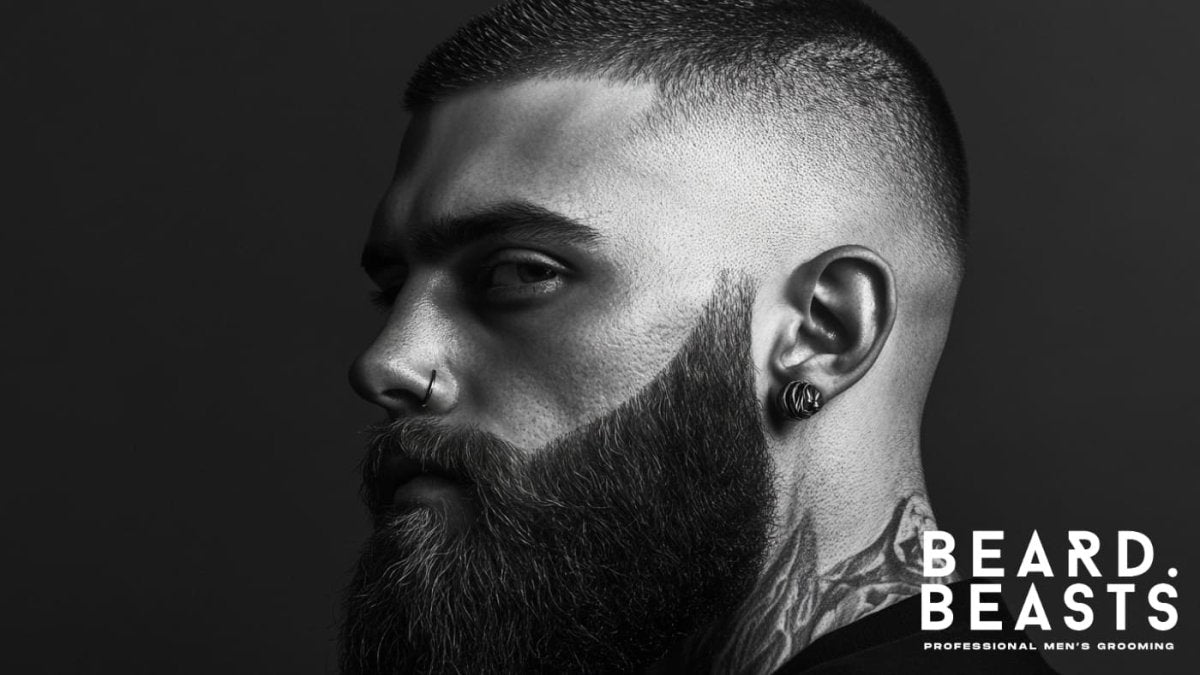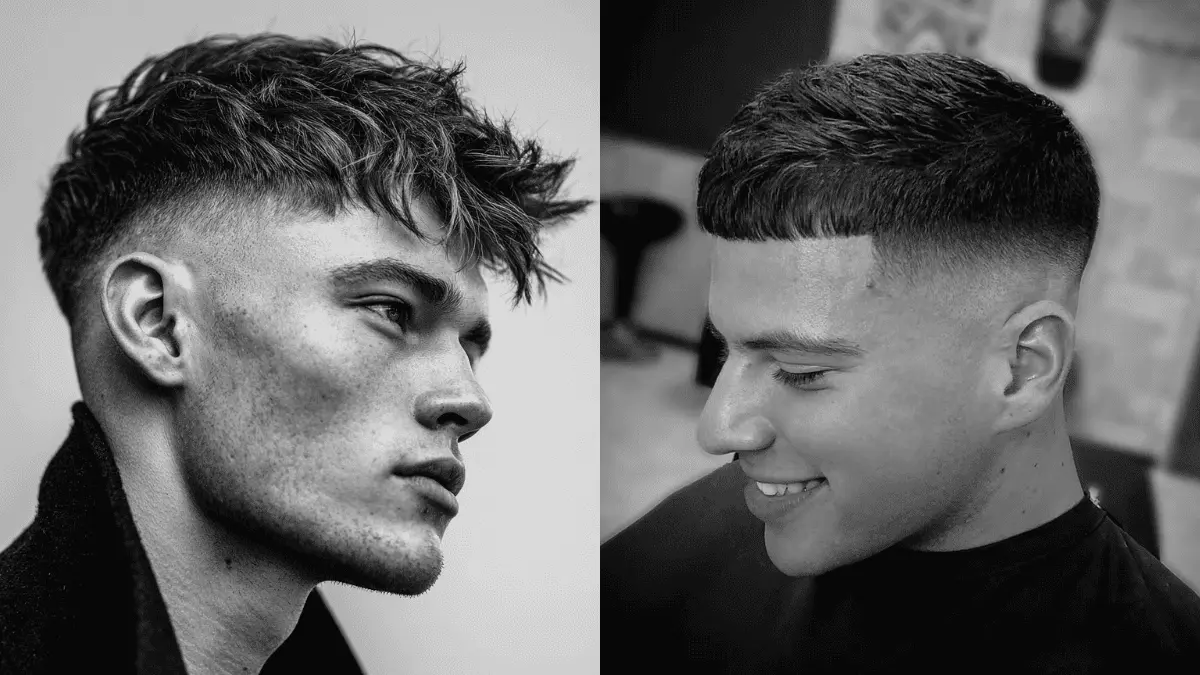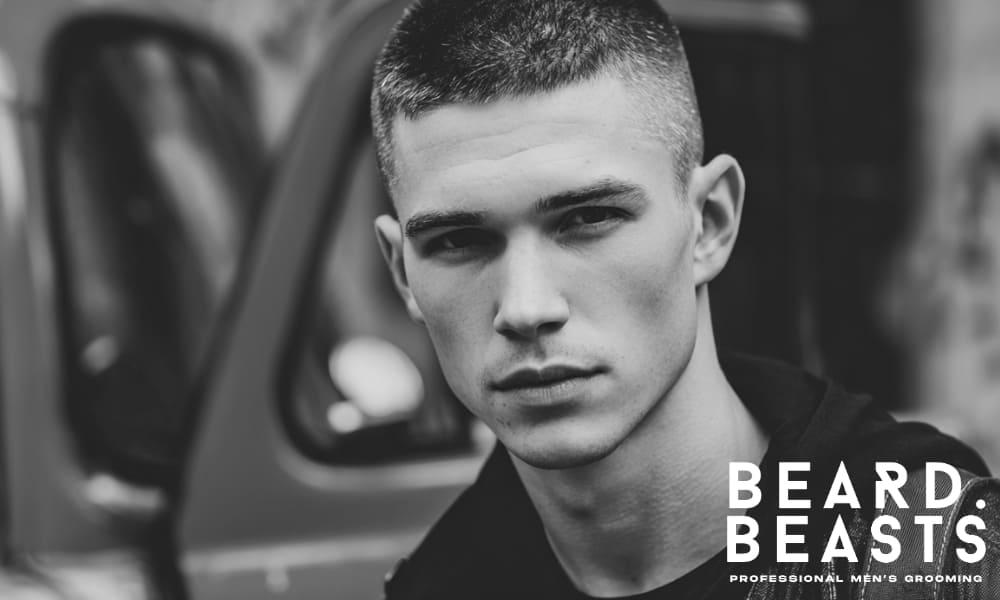The fade haircut has become a defining look in modern men’s style, offering a clean, sharp aesthetic with endless variations. This guide will demystify the world of fades, equipping you with the knowledge to choose, request, and maintain your perfect look. We’ll start by exploring precisely what a fade haircut is, then delve into popular styles, and provide a clear roadmap on how to ask for a fade haircut at the barbershop.
What is a Fade Haircut?
A fade haircut is a classic yet versatile men’s hairstyle characterized by a gradual transition in hair length down the sides and back of the head. This technique creates a smooth, blended look, seamlessly transitioning from longer hair on top to shorter hair towards the neck.
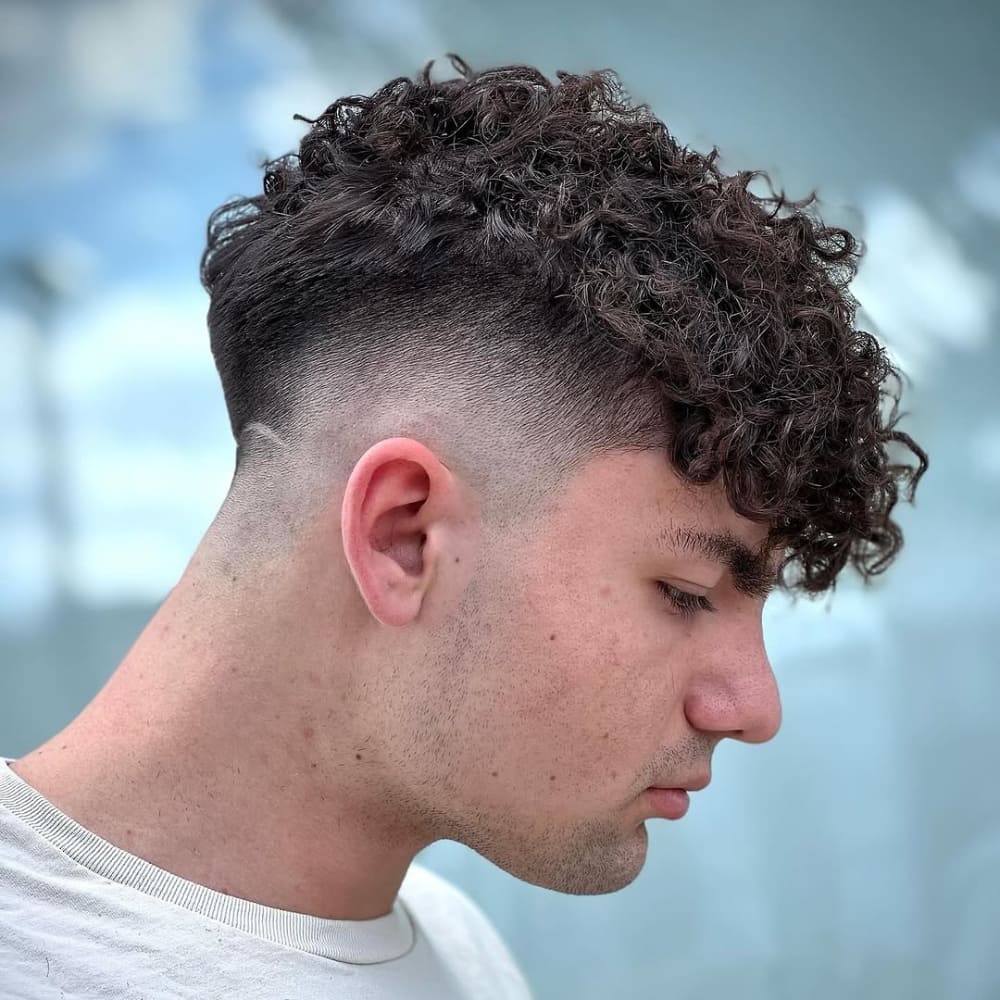
@barberfirmat
The result is a clean, polished appearance without any harsh lines or abrupt changes in length. Unlike the uniform length of a buzz cut or the sharp contrast of an undercut, the fade’s defining feature is its smooth, blended transition. Achieved using clippers with varying guard sizes, the fade offers a refined gradient effect that can range from subtle to dramatic.
Key Characteristics of a Fade Haircut:
- Gradual Transition: The hallmark of a fade is the smooth taper, where hair length progressively shortens from top to bottom.
- Versatility: The fade haircut serves as a foundational element that complements a wide array of styles on top, from classic pompadours and crew cuts to modern textured crops and buzz cuts.
- Clean and Polished Aesthetic: The fade’s seamless blending creates a neat, sharp appearance suitable for any occasion, from casual to formal.
- Customization: The degree of tapering and the starting point of the fade can be customized to suit individual preferences.
The fade haircut offers a unique combination of style, versatility, and precision. By understanding the nuances of what is a fade haircut, you can appreciate its enduring popularity and make an informed decision when choosing your next hairstyle.
Why Choose A Fade Haircut
The fade haircut is a popular choice for its unique blend of style, versatility, and timeless appeal. It’s a go-to option for those seeking a polished look that adapts to any situation. Here’s why you should consider it:
Unmatched Versatility:
- Styling Flexibility: The fade complements numerous styles on top, from classic pompadours to modern textured crops, allowing you to express your unique personality.
- Customization: Choose the fade height—low, mid, or high—to tailor the look to your face shape and desired impact.
- Works with All Hair Types: A skilled barber can adapt the fade to straight, wavy, or curly hair, making it a universally flattering option.
A Clean, Sharp Aesthetic:
- Seamless Blending: The fade’s signature smooth transition between hair lengths creates a polished, refined look without harsh lines.
- Flattering: The tapered effect can enhance your facial features, adding structure and definition.
Timeless and Adaptable:
- Ageless Appeal: The fade suits men of all ages, offering a stylish option for any generation.
- Suitable for Any Occasion: From formal events to casual outings, a fade ensures you always look your best.
In short, the fade haircut offers a winning combination of adaptability, clean aesthetics, and enduring style. It’s a versatile choice that can be tailored to your individual preferences, making it a smart and stylish option for anyone.
Types of Fade Haircuts
The world offade haircuts offers a diverse range of styles, each with its own unique characteristics. Understanding these variations is key to finding the perfect fade for your individual look and personality. Let’s explore some of the most popular types:
High Fade Haircut
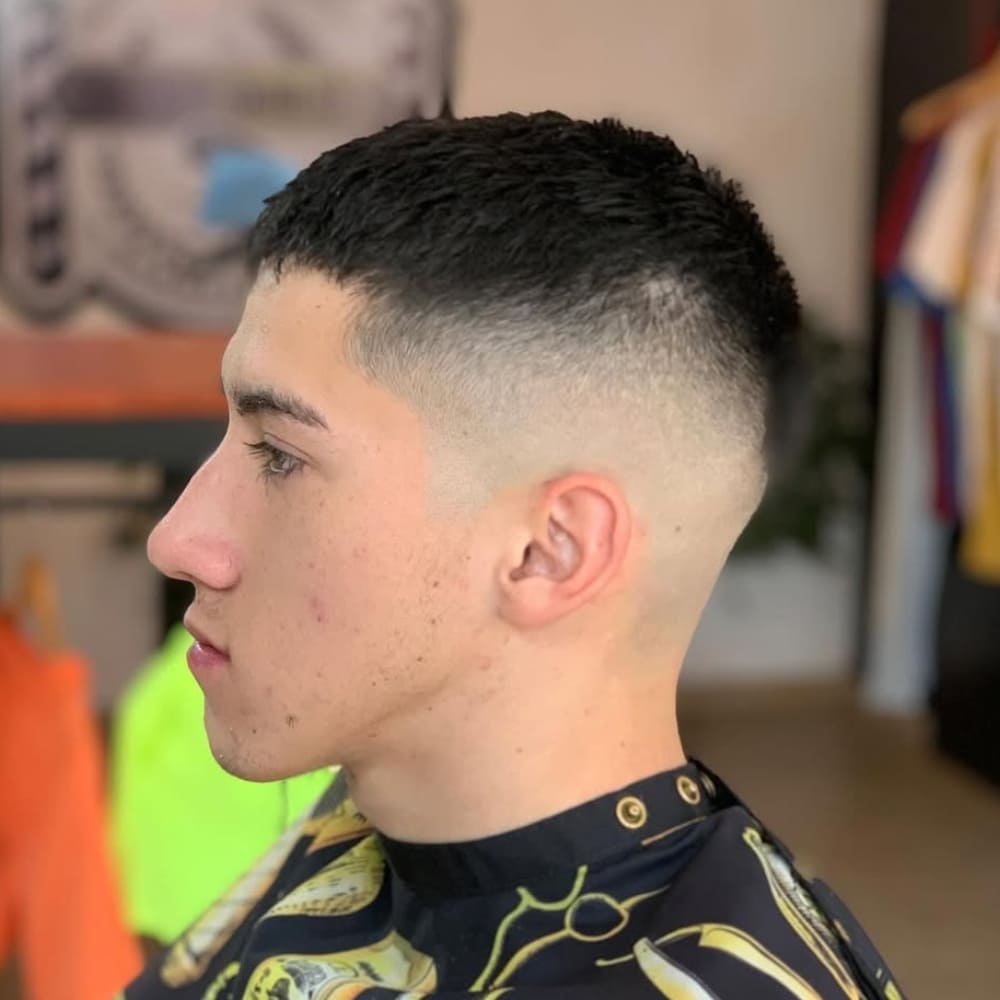
@ediciondorada
The high fade begins above the temples, creating a striking contrast with the longer hair on top. It rapidly tapers down, often to the skin, resulting in a bold and edgy look. This dramatic style emphasizes the hair on top, making it ideal for showcasing voluminous styles like pompadours or quiffs. The high fade is a statement haircut that exudes confidence. It’s a popular choice for those seeking a modern and fashion-forward appearance.
Mid Fade Haircut
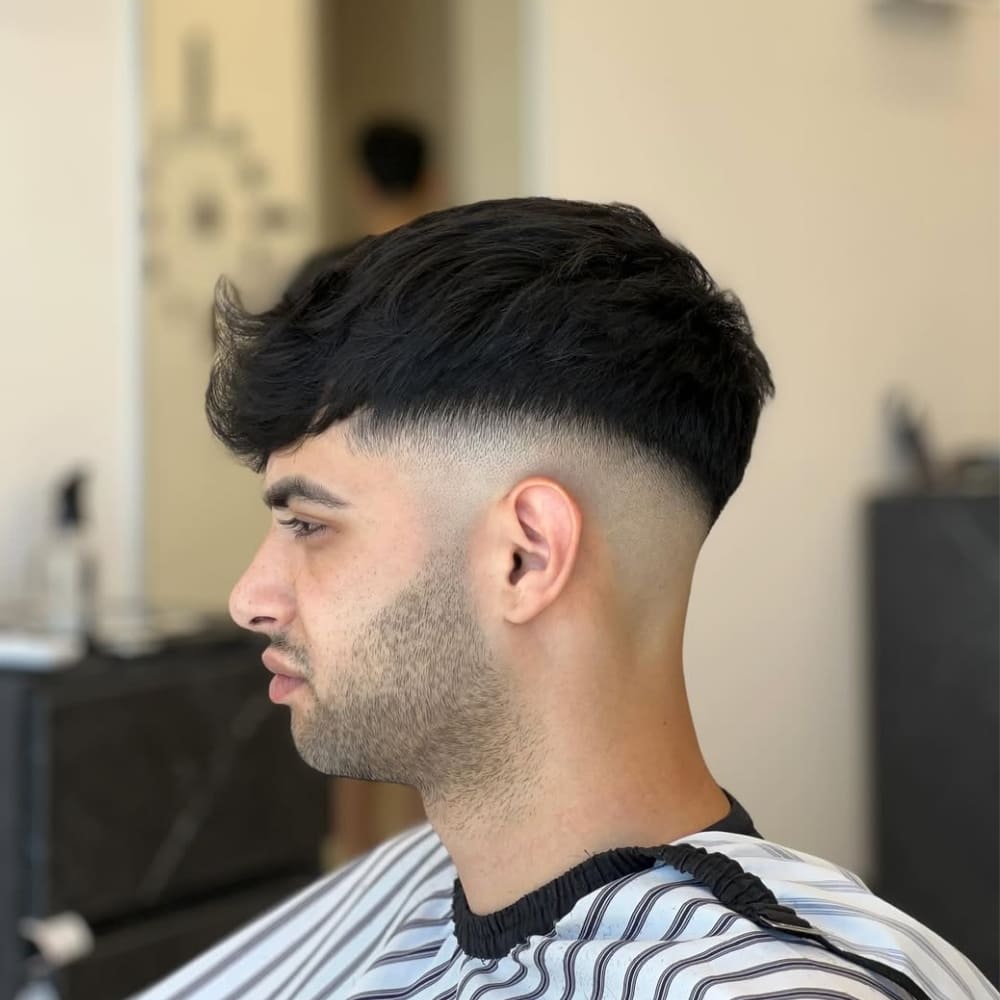
@grekkstyle
The mid fade offers a balanced and versatile approach, starting its transition midway between the temples and ears. This creates a more moderate contrast than the high fade, making it suitable for a wider range of styles. The mid fade provides a clean and polished look without being overly dramatic. It blends seamlessly into various top styles, from textured crops to classic side parts. The gradual taper of the mid fade offers a refined aesthetic that complements most face shapes.
Low Fade Haircut
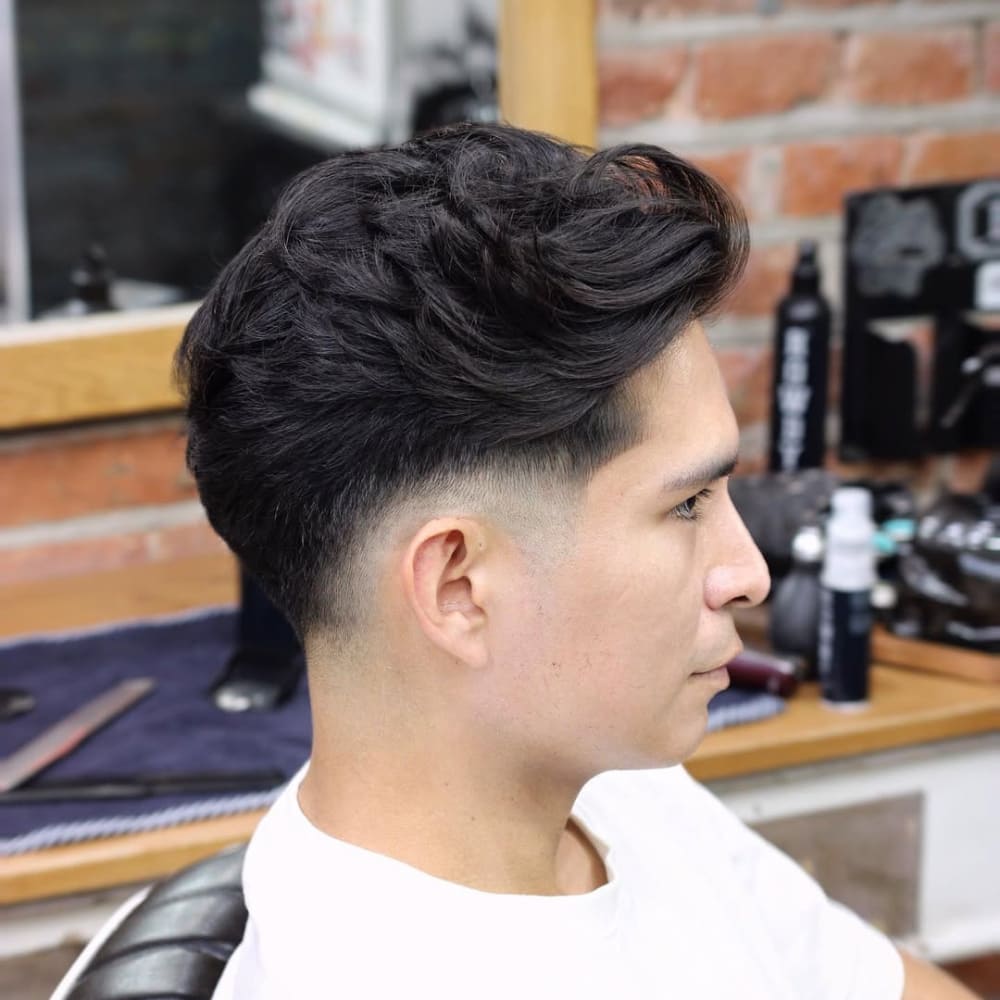
@moh.alfalah
For a subtle and understated look, the low fade is an excellent choice. It begins its gentle taper just above the ears, creating a minimal contrast with the longer hair on top. This fade is perfect for those who prefer a more natural and less dramatic appearance. The low fade adds a touch of refinement without significantly altering the overall shape of the hairstyle. It’s a great option for individuals with finer hair or those who want to maintain a longer length on the sides.
Skin Fade Haircut (Bald Fade)
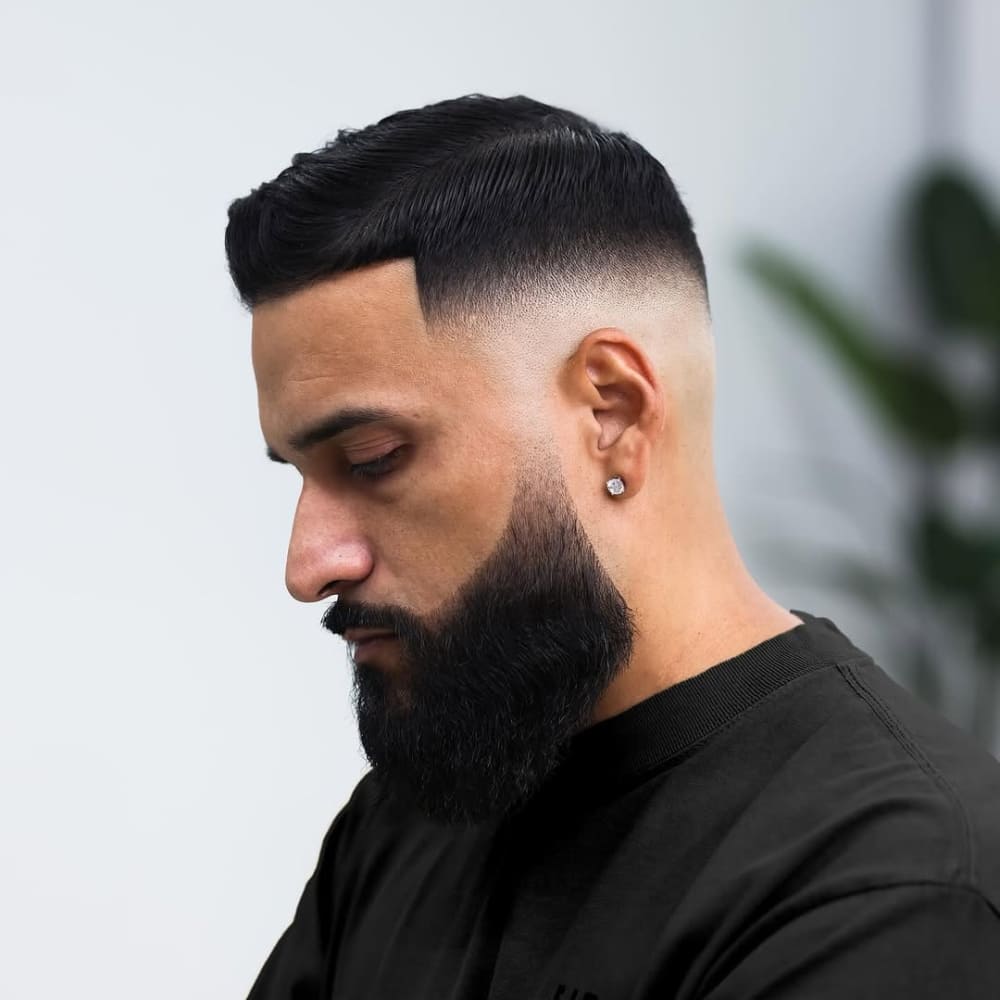
@sergiobarron_
The skin fade, often referred to a bald fade, takes the fade to its extreme by tapering down to bare skin. This creates an ultra-clean, sharp finish that adds a modern and edgy touch to any hairstyle. The skin fade can be incorporated into high, mid, or low fades, offering varying degrees of intensity. This style is particularly effective for highlighting strong facial features. It is a great style to help keep cool in the heat.
Taper Fade Haircut
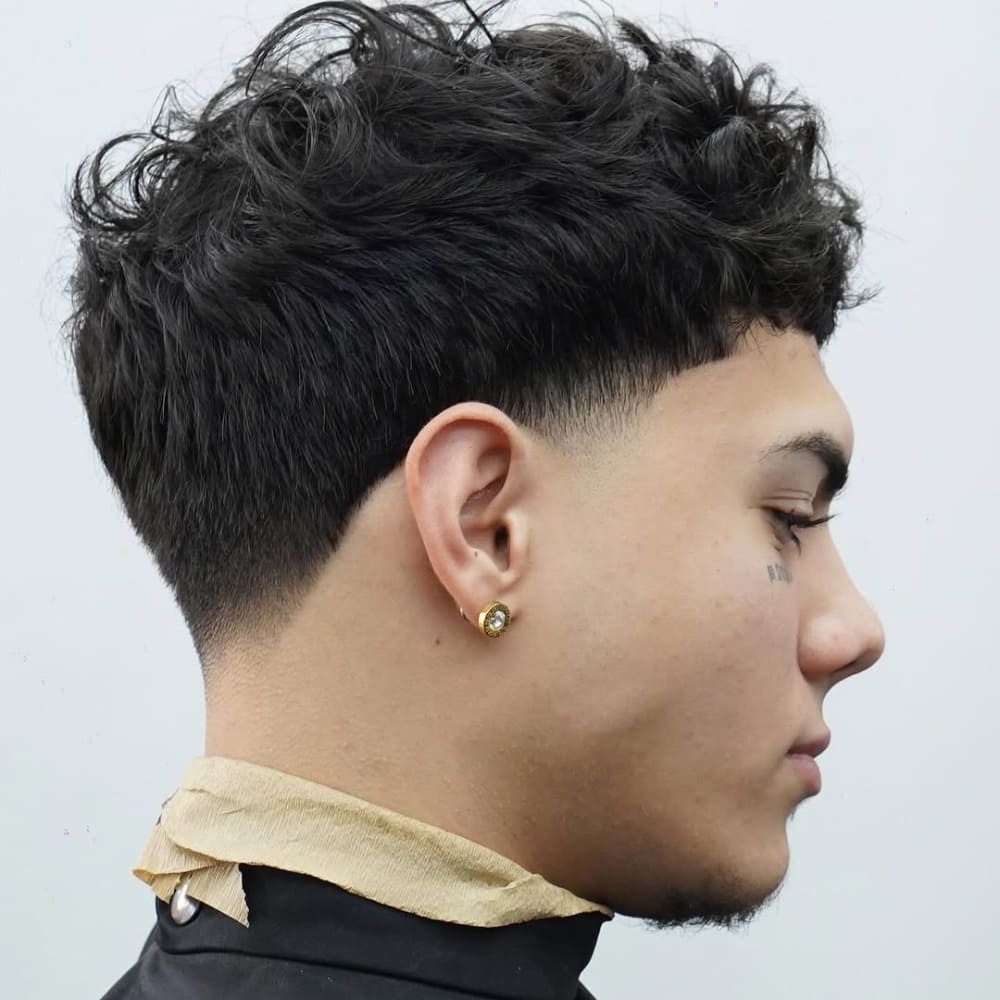
@bashbarber
The taper fade is a classic and timeless style characterized by a gradual decrease in hair length. It typically starts from a longer length on top and subtly tapers down towards the neckline, focusing on the sideburns and nape. Unlike other fades, it doesn’t necessarily go down to the skin. The taper fade is known for its clean lines and its ability to blend seamlessly with longer hairstyles on top. It’s a versatile option that works well with both formal and casual styles.
Drop Fade Haircut
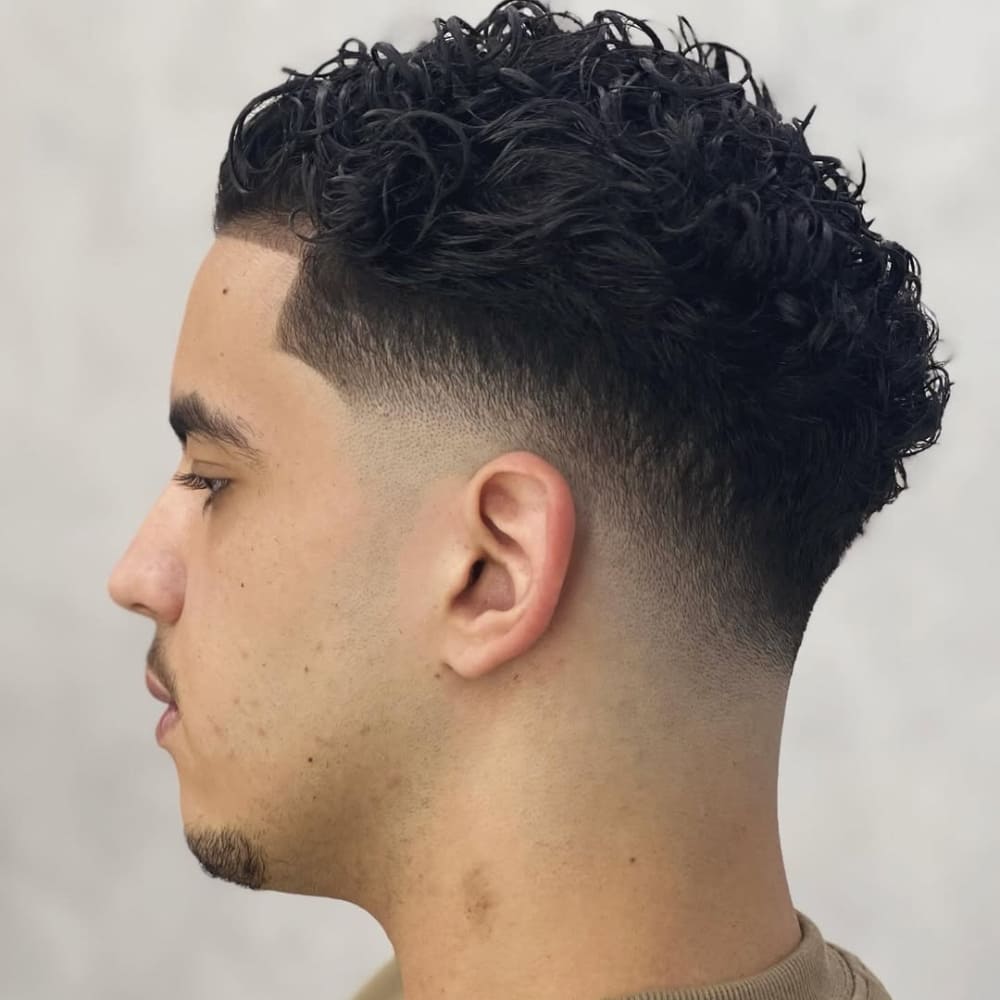
The drop fade puts a unique, stylish twist on the traditional fade. It features a fade that curves downward behind the ear, creating an arc-like shape. This adds a dynamic element to the haircut, providing visual interest and a sense of movement. The drop fade often works best with a bit of length on top to accentuate the curved shape. Those looking for a unique look will like this style.
You can view more styles here!
Choosing Your Perfect Fade Haircut
With so many variations available, you’re sure to find a fade haircut that aligns with your face shape, hair type, and personal style. Whether you opt for the bold definition of a high fade, the balanced versatility of a mid fade, the subtle elegance of a low fade, the sharp precision of a skin fade, the classic refinement of a taper fade or the creative flair of a drop fade, understanding these distinctions will empower you to achieve your desired look.
How To Ask For A Fade Haircut
Knowing how to ask for a fade haircut is the key to getting the perfect look. Clear communication with your barber is essential. Here’s a guide to help you articulate your vision:
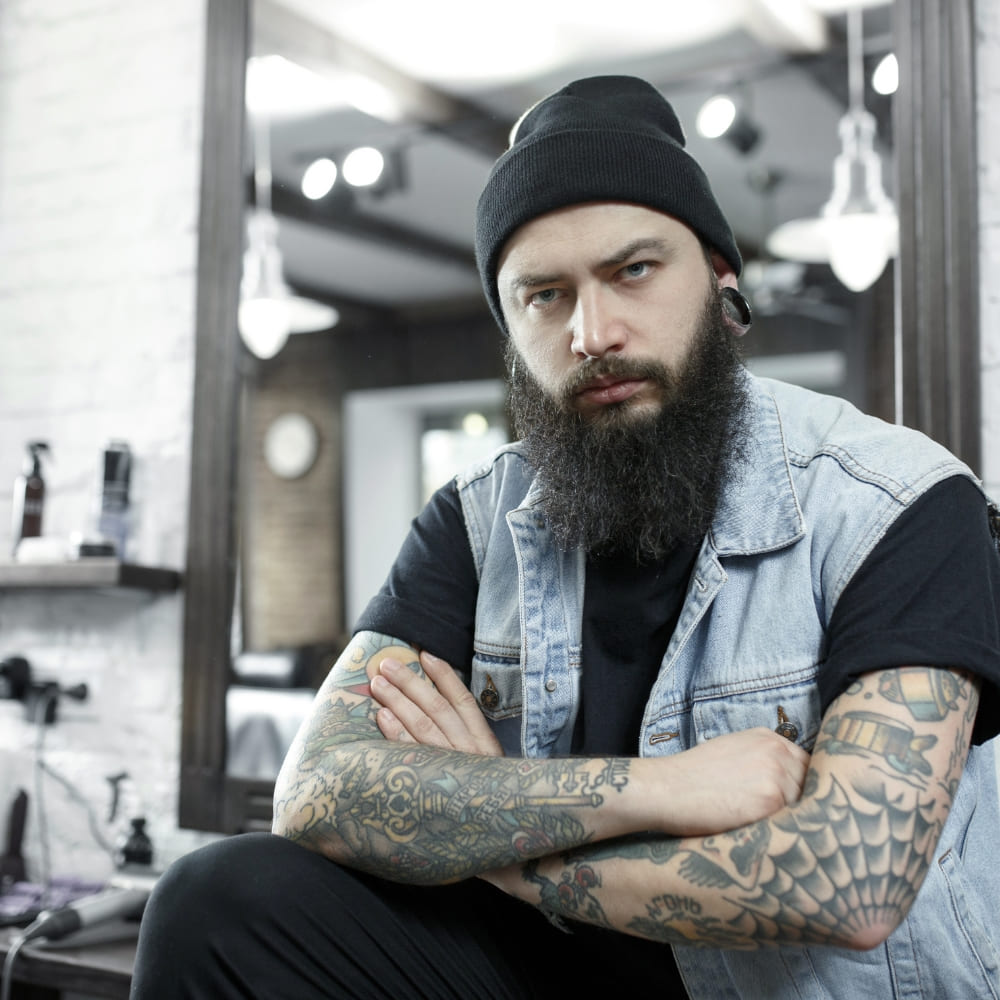
Do Your Research:
- Before your appointment, familiarize yourself with different fade styles: high, mid, low, skin, taper, and drop.
- Look at pictures online and consider your hair type.
Bring Reference Photos:
- Visuals are key! Bring photos that clearly show the fade style, height, and top length you want.
- Multiple angles are ideal to avoid any miscommunication.
Use the Right Terminology:
Knowing basic terms will help you communicate effectively when learning how to ask for a fade haircut.
- High Fade: Starts above the temples.
- Mid Fade: Begins midway between temples and ears.
- Low Fade: Starts just above the ears.
- Skin Fade (Bald Fade): Fades to the skin.
- Taper Fade: Gradual decrease in length, usually around sideburns and neckline.
- Drop Fade: Curves down behind the ears.
Be Specific About the Details:
- Clearly specify your desired fade height (high, mid, or low).
- Indicate how much length you want on top and your intended styling.
- Mention your preferences for sideburns and neckline (e.g., tapered, blocked).
Ask Your Barber Questions:
- Don’t hesitate to ask for recommendations based on your face shape and hair type.
- Inquire about maintenance and styling products.
Collaborate and Trust the Process:
- Be open to your barber’s suggestions; they have the expertise to guide you.
- View the haircut as a collaborative effort.
Maintain Your Fade:
- Schedule regular trims (typically every 2-4 weeks) to keep your fade looking sharp.
Example Conversation:
You: “Hi, I’d like a mid fade, please. I’m trying to learn how to ask for a fade haircut correctly, so I brought these photos. I want to keep about two inches on top for a textured crop and have the sideburns and neckline tapered.”
Barber: “Great, those photos are helpful. A mid fade will suit you. I might suggest starting the fade a bit lower for a smoother blend with your hair type. What do you think?”
By following these tips, you can confidently communicate your vision and achieve the fade haircut of your dreams.
Fade Maintenance and Styling Tips
Achieving the perfectfade haircut is just the first step. To keep your fade looking sharp and fresh, proper maintenance and styling are essential. Here’s a guide to help you maintain your fade and style it like a pro:
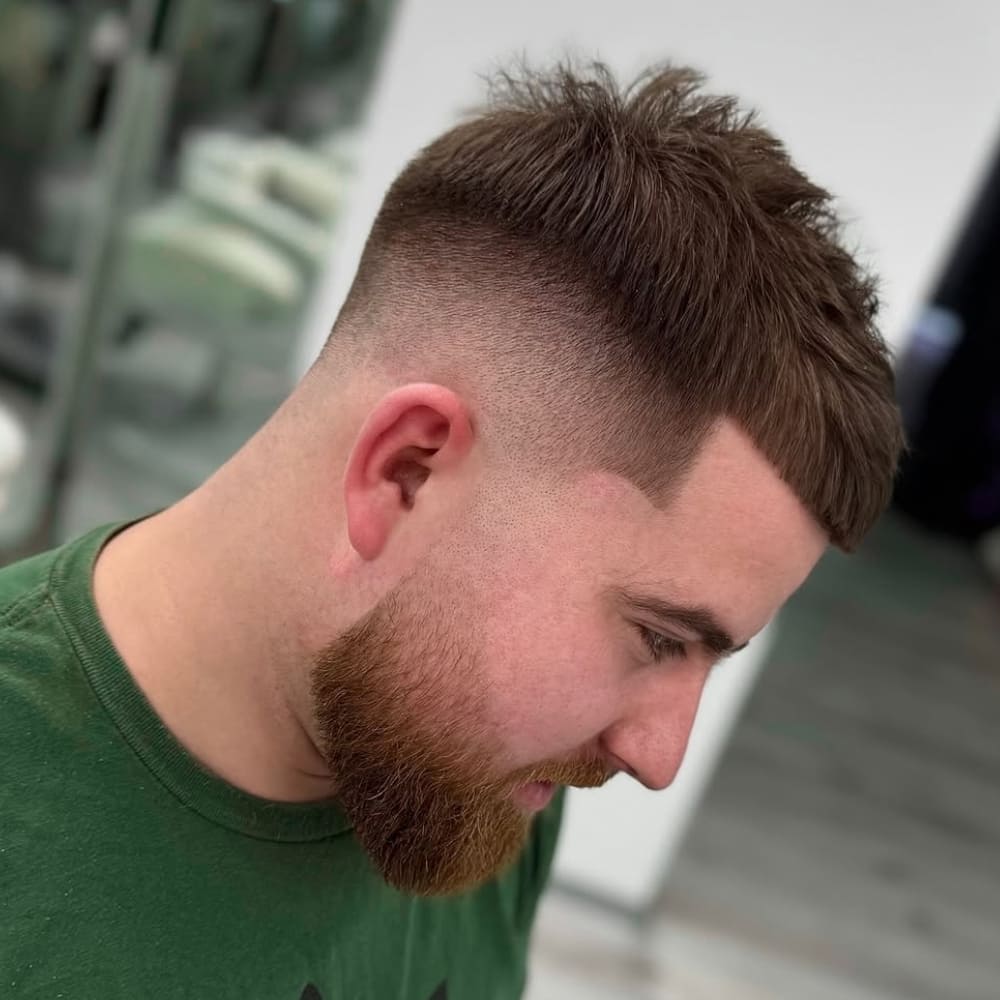
Regular Trims are Key:
- Frequency: The most crucial aspect of fade maintenance is regular trims. Fades, especially skin fades and high fades, tend to grow out quickly and lose their sharpness. For high and skin fades, aim for a touch-up every 1-2 weeks. For mid and low fades, aim for a touch-up every 2-4 weeks, depending on your hair growth rate and fade style.
- Maintain the Blend: Regular trims ensure the seamless blend between different hair lengths remains intact, preserving the defining characteristic of your fade.
Master the Art of At-Home Care:
- Wash and Condition: Use a high-quality shampoo and conditioner suited for your hair type. This will keep your hair healthy and manageable, making styling easier. We recommend the Huron Shampoo and Conditioner Set for their quality.
- Moisturize Your Scalp: If you have a skin fade, keeping your scalp moisturized is crucial to prevent dryness and flakiness. Use a light, non-comedogenic moisturizer or oil specifically designed for the scalp.
- Use a Hair Brush or a Hair Comb: A soft-bristle brush can help distribute natural oils and keep your hair looking neat, particularly if you have a shorter fade.
Invest in the Right Styling Products:
- Product Selection: The right styling product depends on your desired look and hair type. Here are some popular options:
- Pomade: Offers a high hold and shine, ideal for classic styles like pompadours and slick backs.
- Wax: Provides a medium hold with a matte or low-shine finish, perfect for textured styles.
- Clay: Offers a strong hold with a matte finish, great for adding volume and texture.
- Gel: Provides a strong, stiff hold with a high-shine finish, suitable for spikes or slicked-back looks.
- Cream: Offers a light hold with a natural finish, ideal for controlling frizz and adding subtle definition.
- Application: Start with a small amount of product and gradually add more if needed. Over-applying can make your hair look greasy or weighed down.
Styling Techniques for Different Fade Types:
- High Fade: Often paired with longer hair on top. Use a blow dryer and a brush to create volume and shape, then apply your chosen product to style.
- Mid Fade: Versatile and can be styled in many ways. For a textured crop, apply wax or hair clay to damp hair and use your fingers to create definition. For a side part, use a comb and pomade for a clean, polished look.
- Low Fade: Typically requires minimal styling. A light cream or wax can add subtle control and definition.
- Skin Fade: Focus on styling the hair on top. The sides will require little to no product.
- Taper Fade: Often styled with a side part or a brushed-back look. Use a pomade or wax for hold and shine.
- Drop Fade: Works well with textured styles on top. Use a clay or wax to enhance the natural texture and highlight the curved shape of the fade. Using a sea salt spray can help to achieve a beachy, textured look.
Consider Your Lifestyle:
- Active Lifestyle: If you lead an active lifestyle or sweat frequently, opt for a shorter fade that requires less maintenance.
- Professional Setting: A well-maintained, classic fade like a mid or low taper fade often works best in professional environments.
By following these fade maintenance and styling tips, you can keep your fade haircut looking sharp, stylish, and well-groomed between barber visits. Remember, consistency is key to maintaining a great-looking fade!
Conclusion: Mastering The Fade Haircut
The fade haircut has rightfully earned its place as a cornerstone of modern men’s style. Its versatility, clean aesthetic, and adaptability to diverse hair types and face shapes make it a timeless choice. From understanding precisely what is a fade haircut and its many variations, to mastering how to ask for a fade haircut and following essential maintenance and styling tips, this guide has equipped you with the knowledge to achieve and maintain a hairstyle that’s both stylish and sophisticated.
More than just a haircut, the fade is an expression of personal style. So, take the knowledge you’ve gained, collaborate with your barber, and embrace the enduring appeal of the fade haircut.

